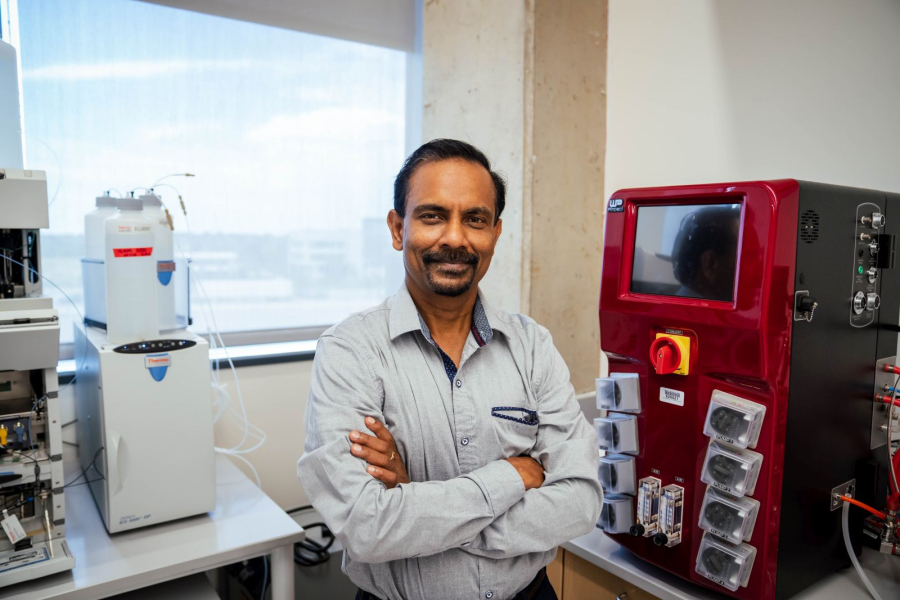Associate professor of biotechnology Venkatesh Balan has been honored with the International Association of Advanced Materials’ Advanced Material Award for his Department of Defense grant-sponsored work with chitin — the resilient, fibrous substance that protects the soft inner tissues of arthropods and helps mushrooms hold their shape.
“Chitin is an amino polysaccharide polymer present in shrimp shells, crab shells, mushrooms, squid, and other living things,” Balan said. “The structure is similar to cellulose, which we use to make everyday paper goods.”
Chitin has the potential to address persistent needs in multiple sectors, including health and medicine and the fight against pollution, in addition to the Department of Defense’s more direct interests.
“When chitin is separated from shrimp or mushrooms and sintered by heating up to a very high temperature, under pressure — it becomes something like plastic, but it’s still biodegradable. We can essentially make biodegradable plastic materials this way,” he added.
Mechanical engineering technology professor Francisco C. Robles Hernández was an important collaborator on this component of the work.
“What’s good about an item made of chitin is the moment you finish using it, you can put it in water and it disintegrates. It’s environmentally friendly; it becomes a fertilizer for plants, it’s natural, biodegradable… there is no trace left behind. In a way, we’re making a biomaterial to overcome this issue of plastic pollution,” Balan said. “That’s how we got started, and then with that we were able to secure a $660,000 grant from DoD to use this chitin molecule to build a bulletproof vest.”
As something small, translucent, and generally associated (at least in name) with something inadequate or perhaps even wimpy, one might not immediately associate them with bulletproof gear, but Balan describes the shrimp as a bioengineering marvel.
“Some of these shrimp are living in water conditions with very high pressure in the currents and depths. Their chitin is designed in such a way that it can interact with the water, and at the same time it can withstand a lot of pressure. It is light, but it can be made very hard and used to produce biocomposite materials and hydrogels,” he said.
“We also went on to chemically modify this chitin molecule to raise its stability from up 300°C to up to 450°. Increasing the temperature stability allows us to now start working with these materials under extreme weather conditions,” Balan said. “Chitin also absorbs and releases water very quickly, so we were able to make a thin film that can be used to measure the humidity in seconds. This material can be used, for example, in hospital masks and other circumstances necessitating rapid moisture detection.”
Balan cites Cullen College of Engineering Materials Engineering Program Director Alamgir Karim and Professor Megan Robertson, both of the Department of Chemical and Biomolecular Engineering, as instrumental collaborators on this phase on the project.
“Recently, we’ve also begun making chitin-based healing materials,” he added. “We’re developing a 3D printer that will allow us to coat the surface of severe burn wounds in a protective layer that will heal naturally, without the need to remove stitches.”
Currently, fish skin is used to treat some severe burns in a similar fashion, but is not as biocompatible as chitin, which can ultimately serve as scaffolding for new skin to grow on and around during the healing process. Chitin also possesses antimicrobial properties, helping to defend against secondary infections.
“Winning this award is almost like a pat on the back,” Balan said. “There’s no monetary award; it’s just recognition, because in research, we need that extra boost every now and then to say ‘Hey, you guys are doing a good job. Keep going!’ That’s what this is about.”
As an IAAM awardee, Balan will be presenting a lecture to other interested materials scientists via livestream in August at the European Advanced Materials Congress in Sweden.
